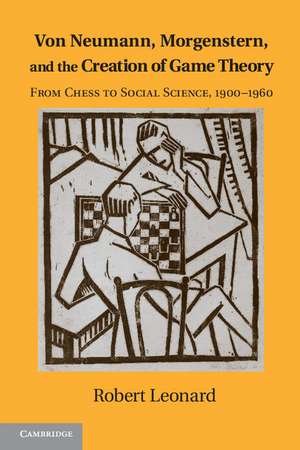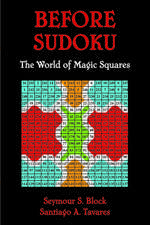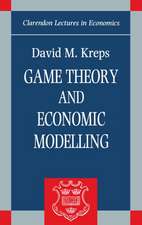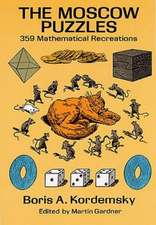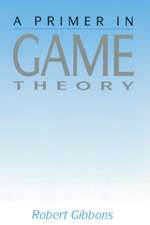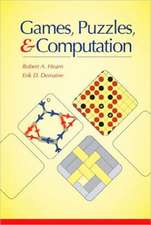Von Neumann, Morgenstern, and the Creation of Game Theory: From Chess to Social Science, 1900–1960: Historical Perspectives on Modern Economics
Autor Robert Leonarden Limba Engleză Paperback – 28 iun 2012
| Toate formatele și edițiile | Preț | Express |
|---|---|---|
| Paperback (1) | 326.92 lei 43-57 zile | |
| Cambridge University Press – 28 iun 2012 | 326.92 lei 43-57 zile | |
| Hardback (1) | 787.78 lei 43-57 zile | |
| Cambridge University Press – 27 iun 2010 | 787.78 lei 43-57 zile |
Din seria Historical Perspectives on Modern Economics
-
 Preț: 322.86 lei
Preț: 322.86 lei -
 Preț: 200.09 lei
Preț: 200.09 lei -
 Preț: 277.57 lei
Preț: 277.57 lei -
 Preț: 307.58 lei
Preț: 307.58 lei -
 Preț: 288.62 lei
Preț: 288.62 lei -
 Preț: 277.65 lei
Preț: 277.65 lei -
 Preț: 430.14 lei
Preț: 430.14 lei -
 Preț: 350.91 lei
Preț: 350.91 lei - 11%
 Preț: 536.98 lei
Preț: 536.98 lei -
 Preț: 289.19 lei
Preț: 289.19 lei -
 Preț: 400.76 lei
Preț: 400.76 lei -
 Preț: 323.27 lei
Preț: 323.27 lei - 11%
 Preț: 577.27 lei
Preț: 577.27 lei -
 Preț: 331.09 lei
Preț: 331.09 lei -
 Preț: 357.37 lei
Preț: 357.37 lei -
 Preț: 395.17 lei
Preț: 395.17 lei -
 Preț: 286.69 lei
Preț: 286.69 lei - 14%
 Preț: 787.78 lei
Preț: 787.78 lei -
 Preț: 364.08 lei
Preț: 364.08 lei -
 Preț: 357.91 lei
Preț: 357.91 lei -
 Preț: 355.54 lei
Preț: 355.54 lei -
 Preț: 321.90 lei
Preț: 321.90 lei -
 Preț: 441.58 lei
Preț: 441.58 lei -
 Preț: 259.95 lei
Preț: 259.95 lei -
 Preț: 272.75 lei
Preț: 272.75 lei -
 Preț: 442.22 lei
Preț: 442.22 lei -
 Preț: 414.74 lei
Preț: 414.74 lei - 14%
 Preț: 728.05 lei
Preț: 728.05 lei -
 Preț: 266.98 lei
Preț: 266.98 lei -
 Preț: 392.82 lei
Preț: 392.82 lei -
 Preț: 309.49 lei
Preț: 309.49 lei
Preț: 326.92 lei
Nou
Puncte Express: 490
Preț estimativ în valută:
62.58€ • 67.99$ • 52.60£
62.58€ • 67.99$ • 52.60£
Carte tipărită la comandă
Livrare economică 21 aprilie-05 mai
Preluare comenzi: 021 569.72.76
Specificații
ISBN-13: 9781107609266
ISBN-10: 1107609267
Pagini: 422
Ilustrații: 36 b/w illus.
Dimensiuni: 150 x 229 x 23 mm
Greutate: 0.64 kg
Editura: Cambridge University Press
Colecția Cambridge University Press
Seria Historical Perspectives on Modern Economics
Locul publicării:New York, United States
ISBN-10: 1107609267
Pagini: 422
Ilustrații: 36 b/w illus.
Dimensiuni: 150 x 229 x 23 mm
Greutate: 0.64 kg
Editura: Cambridge University Press
Colecția Cambridge University Press
Seria Historical Perspectives on Modern Economics
Locul publicării:New York, United States
Cuprins
Introduction; Part I. Struggle and Equilibrium: From Lasker to von Neumann: 1. 'The strangest states of mind': chess, psychology and Emanuel Lasker's Kampf; 2. 'Deeply rooted yet alien': Hungarian Jews and mathematicians; 3. From Budapest to Göttingen: an apprenticeship in modern mathematics; 4. 'The futile search for the perfect formula': von Neumann's minimax theorem; Part II. Oskar Morgenstern and Interwar Vienna: 5. Equilibrium on trial: the young Morgenstern and the Austrian school; 6. Wrestling with complexity: Wirtschaftsprognose and beyond; 7. Ethics and the excluded middle: Karl Menger and social science; 8. From Austroliberalism to Anschluss: the Viennese economists in the 1930s; Part III. From War to Cold War: 9. Mathematics and the social order: von Neumann's return to game theory; 10. Ars combinatoria: writing the theory of games; 11. Morgenstern's catharsis; 12. Von Neumann's war; 13. Social science and the 'present danger': game theory and psychology at the RAND Corporation, 1946–60; Conclusion.
Recenzii
'Robert Leonard toiled for more than a decade on his manuscript on the creators and creation of game theory. His nuanced account is 'thick history' at its best; he captures the protagonists and their milieu with precision and flair. It is a signal achievement.' Bruce Caldwell, Duke University
'The publication of Theory of Games and Economic Behavior by John von Neumann and Oskar Morgenstern in 1944 was hailed by one reviewer as 'one of the major scientific achievements of the first half of the twentieth century'. In this exemplary study in the history of economics, Robert Leonard has given us a masterful account of the gestation of this work, starting with the importance of chess in European intellectual life at the beginning of the twentieth century and ending with the military applications of game theory at the RAND Corporation during the middle of the century. Leonard has given us absorbing parallel biographies of von Neumann and Morgenstern, while painting a fascinating background of the Hungarian mathematical scene and the Viennese economic world. Every practitioner of game theory and every student of twentieth-century intellectual history should read this book.' Harold W. Kuhn, Princeton University
'Robert Leonard excavates a multifarious genealogy for John von Neumann and Oskar Morgenstern's pioneering Theory of Games and Economic Behavior across a landscape that features some of the early twentieth century's key sites of mathematical aspiration, economic disputation, and political and personal tragedy.' Ted Porter, University of California, Los Angeles
'This fine book provides a rich context for the understanding of the Austrian school of economics together with the mathematics of Hungary, Germany, and elsewhere that culminated in the theory of games. It is the product of many years of scholarship and presents much information basically unknown to those who came to game theory after the 1940s.' Martin Shubik, Journal of Economic Literature
'Leonard unpacks the contributions of developments in psychology, philosophy, mathematics, economics, and politics to the origins of game theory. He shows how external events - the rise of Nazism, World War II, and the beginning of the Cold War - interacted with the personalities of von Neumann and Morgenstern and their successors to shape the development of the theory itself and the unanticipated uses to which it has been put. The result is a book that combines the rigor of a textbook with the excitement of a historical novel.' Marina von Neumann Whitman, University of Michigan
'Leonard's masterful fresco follows the development of game theory from its prelude in turn-of-the-century Vienna chess cafes and the mathematical circles of Hungary to its multifarious first steps in the writings of Borel and Zermelo …' Giacomo Sillari, History of Economic Thought and Policy
'Von Neumann and Morgenstern's landmark 1944 book, Theory of Games and Economic Behavior, has long proven enigmatic. As is well known, the book's immediate impact on economic theory was minor, yet it has been widely cited as the inspiration for game theory as it has infiltrated economics since the 1980s … What is clear is that [this] book represents immense achievement in the way it links the histories of science, economics, and cultural and social history through the early careers of John von Neumann and Oskar Morgenstern. To a broader audience, its attention to social and political context will make parts of the book read like a page-turner, while it will remain a rich resource for the scholarly initiate.' Journal of Economics and Philosophy
'The publication of Theory of Games and Economic Behavior by John von Neumann and Oskar Morgenstern in 1944 was hailed by one reviewer as 'one of the major scientific achievements of the first half of the twentieth century'. In this exemplary study in the history of economics, Robert Leonard has given us a masterful account of the gestation of this work, starting with the importance of chess in European intellectual life at the beginning of the twentieth century and ending with the military applications of game theory at the RAND Corporation during the middle of the century. Leonard has given us absorbing parallel biographies of von Neumann and Morgenstern, while painting a fascinating background of the Hungarian mathematical scene and the Viennese economic world. Every practitioner of game theory and every student of twentieth-century intellectual history should read this book.' Harold W. Kuhn, Princeton University
'Robert Leonard excavates a multifarious genealogy for John von Neumann and Oskar Morgenstern's pioneering Theory of Games and Economic Behavior across a landscape that features some of the early twentieth century's key sites of mathematical aspiration, economic disputation, and political and personal tragedy.' Ted Porter, University of California, Los Angeles
'This fine book provides a rich context for the understanding of the Austrian school of economics together with the mathematics of Hungary, Germany, and elsewhere that culminated in the theory of games. It is the product of many years of scholarship and presents much information basically unknown to those who came to game theory after the 1940s.' Martin Shubik, Journal of Economic Literature
'Leonard unpacks the contributions of developments in psychology, philosophy, mathematics, economics, and politics to the origins of game theory. He shows how external events - the rise of Nazism, World War II, and the beginning of the Cold War - interacted with the personalities of von Neumann and Morgenstern and their successors to shape the development of the theory itself and the unanticipated uses to which it has been put. The result is a book that combines the rigor of a textbook with the excitement of a historical novel.' Marina von Neumann Whitman, University of Michigan
'Leonard's masterful fresco follows the development of game theory from its prelude in turn-of-the-century Vienna chess cafes and the mathematical circles of Hungary to its multifarious first steps in the writings of Borel and Zermelo …' Giacomo Sillari, History of Economic Thought and Policy
'Von Neumann and Morgenstern's landmark 1944 book, Theory of Games and Economic Behavior, has long proven enigmatic. As is well known, the book's immediate impact on economic theory was minor, yet it has been widely cited as the inspiration for game theory as it has infiltrated economics since the 1980s … What is clear is that [this] book represents immense achievement in the way it links the histories of science, economics, and cultural and social history through the early careers of John von Neumann and Oskar Morgenstern. To a broader audience, its attention to social and political context will make parts of the book read like a page-turner, while it will remain a rich resource for the scholarly initiate.' Journal of Economics and Philosophy
Notă biografică
Descriere
A reconstruction of the creation of game theory in the twentieth century by John von Neumann and Oskar Morgenstern.
